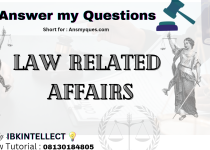Summary of Saul Raccah V Standard Co. of Nig ltd case
Saul Raccah V Standard Co. of Nig ltd [1938]
In that case, W was employed to act as agent for the defendant for the purchase of produce to the knowledge of the defendant’s representatives. Subsequently, its representatives instructed W not to purchase produce any more for the defendant. Notwithstanding this instruction, W induced the plaintiff to enter into a contract to sell produce to him. The plaintiff had previously dealt with ‘W’ as agent for the defendant and had believed that W still retained the authority of the defendant. The plaintiff in the action claimed from the defendant the contract price of the produce supplied to W. It was held that the claim succeeded.
Judgment: The court observed as follows:
“…. where any person by word or conduct, represents or permits it to be represented that another person has authority to act on his behalf, he is bound by the acts of such other person with respect to anyone dealing with him as an agent on the faith of such representation, to the same extent as if such other person had the authority, he was so represented to have”.
This principle boarders on Ostensible Authority of an agent in Commercial Law : Ostensible or apparent authority may be established by showing that the agent has been conducting similar transactions or doing similar acts to the knowledge of the principal without his objection thereto
It follows that where one person expressly or impliedly represents another to have authority to act on his behalf so that a third party reasonably believes him to possess that authority and deals with him in reliance on the representation the person making the representation will be bound to the same extent as if actual authority had in fact been conferred. He is estopped from denying the ostensible authority which he has created.
Just as the case of agency by estoppel, it is extremely important to note three things. First, a representation must be made by or with the authority of the principal. Ostensible authority cannot be created simply by a representation of the agent himself. Secondly, the 3rd party must rely on a representation of the agent’s authority to act as agent; the doctrine cannot apply where the third party does not know or believe him to be an agent e.g. if the existence of the principal is unknown to him. Thirdly, the alteration of position as a result of such reliance.
also See Rama Corp. v Proved Tin & General Investments Ltd
Hey There, you’re welcome once again to Ansmyques.com (short for Answer my Questions) blog, you can type the name of any case you’re looking for in the search box below or above as we’ve made summary of many cases available. have a nice time.

